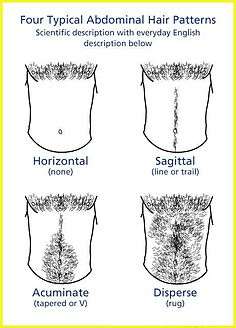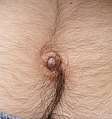Abdominal hair
Abdominal hair is the hair that grows on the abdomen of humans and non-human mammals, in the region between the pubic area and the thorax (chest). The growth of abdominal hair follows the same pattern on nearly all mammals, vertically from the pubic area upwards and from the thorax downwards to the navel. The abdominal hair of non-human mammals is part of the pelage, (hair or fur).

In humans
Before puberty, the abdominal region of both males and females is covered with very fine vellus hair. In response to rising levels of androgens (mainly testosterone) during and after puberty, the skin of the abdomen begins to produce coarser, longer and more pigmented hair (terminal hair). This process primarily affects men. Initially hair grows in a vertical line from the pubic area up to the navel and from the thorax down to the navel. Although the development of abdominal hair normally begins during puberty, it may also start later, between the ages of 20 and 30. With some men, the abdominal hair will stay within a clearly defined vertical line, but in others, terminal hair will appear laterally as well as vertically, particularly in the area around the navel. This lateral spreading can continue into middle age.
Some women may develop a small line of hair from the pubic area up to the navel. Excessive abdominal hair on women, following the male pattern, is a type of hirsutism.
Patterns
- Horizontal — Characterized by upper surface of pubic hair terminating in a horizontal line with no hair extending to the abdomen.
- Sagittal — Resembles the first but with the addition of a narrow vertical band of hair extending from the pubic hair towards the navel, often slang called a 'Treasure Trail' or 'Happy Trail'.
- Acuminate — Characterized by a tapered, inverted 'V' pattern extending upward from the pubic hair. Upper limit may end below the navel, at the navel, above the navel or near the chest.[1]
- Disperse (or quadrangular) — Hair is distributed broadly over the abdomen without forming a discrete geometric pattern.[2]
Richard Zickler performed a 1997 study of 800 photographs of the above patterns and their occurrence in males and females, paying particular attention to the development of hair during puberty. In Zickler's study the horizontal pattern was most common in females with an incidence of about 80 percent. The acuminate pattern occurred in about 55 percent of males and occasionally in females. The disperse pattern occurred in about 19 percent of the males studied.[3]
Gallery

.jpg) Horizontal hair growth (none)
Horizontal hair growth (none).jpg) Sagittal hair growth below the navel only
Sagittal hair growth below the navel only Sagittal hair growth above and below the navel
Sagittal hair growth above and below the navel Acuminate hair growth around the navel
Acuminate hair growth around the navel Disperse hair growth on the abdomen
Disperse hair growth on the abdomen Disperse hair growth
Disperse hair growth
See also
References
- Setty LR (May 1966). "Varieties of the acuminate abdominal hair pattern of white males". J Natl Med Assoc. 58 (3): 191–3. PMC 2611109. PMID 5932294.
- Setty LR (January 1967). "Varieties of the quadrangular abdominal hair pattern of white males". J Natl Med Assoc. 59 (1): 45–7. PMC 2611300. PMID 6038587.
- Zickler, Rienhard A. (1997). "Sex Differences in Pubic Hair Distribution in White Population". Archived from the original on August 17, 2011.
Further reading
The following journal articles include sketches of different abdominal hair patterns and observed percentages of men exhibiting each pattern.
- See Setty's articles in references.
- Szabo G (22 September 1967). "The Regional Anatomy of the Human Integument with Special Reference to the Distribution of Hair Follicles, Sweat Glands and Melanocytes". Phil. Trans. R. Soc. Lond. B. 252 (779): 447–485. doi:10.1098/rstb.1967.0029.